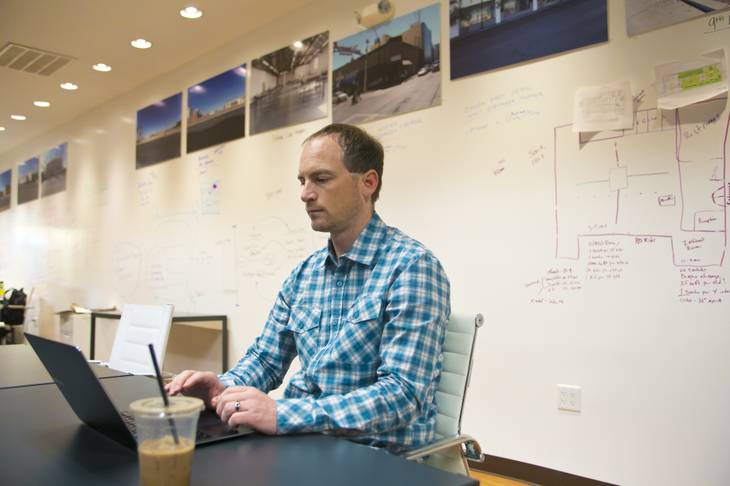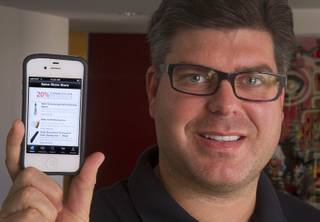The Las Vegas tech scene is a lot like other startup hubs around the country.
Grown men in hoodies and sneakers tap away on laptops in coffee shops designing websites, iPhone apps and social media sites. Their companies’ names consist of mashed letters and numbers and made-up words, such as 8byte8, WinTech and Mindelusions.
But unlike in other regions, Las Vegas’ tech industry is short on a key ingredient: money.
In spite of the city’s recent startup boom, there remains a small number of local investors willing to put cash into tech companies. And the funding gap could stanch tech development in the valley, as most startups earn paltry revenue and could easily flop or stagnate without outside capital.
Local entrepreneurs and investors point out that it’s always hard for tech startups to raise money and build thriving businesses, no matter where they are based. It’s also common for startups to look beyond their home cities for funding. But if the number of financiers in Las Vegas kept better pace with the number of startups in the valley, it would be easier for local entrepreneurs to hire employees, develop products and diversify the state’s economy.
As it is now, the local tech scene is relatively small and not widely diversified. There’s only one big local non-gaming employer – Zappos – and many firms are small startups focused on social media.
The biggest local source of investor cash for techies is the $50 million VegasTechFund, which includes money from Zappos CEO Tony Hsieh and other Zappos executives. The fund so far has invested in nine startups an average of $300,000 each.
Beyond that pot of money, it’s slim pickings to find local tech-focused investors, said Tommy Bell, founder of Salon Share.
Bell, a 34-year-old Las Vegas native, has raised about $225,000 for his 9-month-old website, which helps stylists book appointments and sell hair products. His biggest investor so far is a local radiologist, whom he met two years ago through a mutual acquaintance.
“I know a lot of people are talking about Las Vegas tech startups, but there’s very little funding,” said Bell, who is based downtown in a South 4th Street office.
Startup founders always have to demonstrate to potential investors that they have a strong executive team and solid business plan. But Las Vegas has fewer local investors than other regions, and it can be hard to raise money here, Rumgr CEO Dylan Bathurst said.
Bathurst’s year-old Internet classified service raised $500,000 from Hsieh, two other Zappos executives and Resort Gaming Group CEO Andrew Donner, whose company bought the old City Hall downtown and is leasing it to Zappos for headquarters.
Unlike tech hubs Boston, New York City and Austin, Texas, where many tech investors have partners, few money men have people on the ground here. Investors often want to be a short drive from the companies they fund, so they can easily monitor them.
Additionally, most wealthy Las Vegans made their fortunes from casino and real estate deals, and despite their business savvy, they don’t always understand the tech world, people in the technology industry said. Tech startups need investors who also are good mentors and can improve the businesses, not just provide them capital, said Bathurst, a 26-year-old from Kansas.
•••
There are dozens of startups in the valley, although it’s unclear how many are people’s side projects or actual full-time businesses.
Typical startups have one to three employees and are run out of apartments or small offices. Until owners get investor capital, the companies usually are self-funded or financed by family and friends.
Local executives say there aren’t any venture-capital firms — groups that finance young, somewhat-successful tech companies — with offices in Las Vegas. And there are only a few “angel” investment groups locally, but they either are new or relatively inactive. Angels typically invest in unproven startups and spend far less per deal than venture capitalists.
VegasTechFund, the valley’s largest tech-investment group, was formed only a few months ago. So far, it has invested in nine companies at an average of $300,000 each, partner Andy White said.
Its deals usually are part of a broader capital push involving other investors. The fund’s investments include online social polling company Wedgies, the women-focused retailer Ecomom and the bowling website Rolltech.
Each week, White and his partners speak with 30 companies that want capital, he said.
“It should be hard,” White said of raising money. “But is it impossible? No. Are there ways that you can increase your likelihood of getting funded? Absolutely. But none of it’s easy.”
Some Las Vegas startups get more money than others, but winning access to that capital takes more than just a good idea. Tech startups have a high failure rate, and entrepreneurs need products that can gain traction if they hope to land investor funding.
Ecomom, which moved downtown in January from Southern California, has raised $10.7 million since its 2004 inception. The site researches products and assesses them based on health and safety. It now employs 34 people, including 24 in Las Vegas.
Romotive, which makes an iPhone-controlled robot that interacts with people, recently raised $5 million from Silicon Valley venture firm Sequoia Capital and other investors. The company, which employs 18 people locally, now is in the process of getting 4,000 to 8,000 robots a week manufactured in China.
Social-media site Tracky has raised $1.5 million of angel funding, including $500,000 from Rob Roy, founder of Las Vegas data-center operator Switch. Tracky offers customers ways to organize their lives, including to-do lists, calendars, data storage and task management.
Until the past few years, it was tough finding local tech startups that were worth backing, angel investor and Henderson resident Bill Payne said. Since 1980, Payne, an engineer by trade who once sold a company he co-founded to DuPont, has invested in 60 companies, two-thirds of which were tech firms but only three of which were based in Las Vegas.
Better companies are popping up now, thanks largely to Hsieh and Roy, and there is a growing awareness of Las Vegas’ burgeoning tech scene, Payne said.
“It is definitely an improved situation from what we’ve seen in the past, and it’s exciting,” he said.
The Vegas Valley Angels also are looking for companies in which to invest. Formed a decade ago, the angel investment group slowed during the recession, fueling speculation among tech executives that it had disbanded. In fact, after taking a back seat during the downturn and meeting less frequently because there were no deals to consider, it remains intact and is looking for deals, member Joe Russo said. He heads the Angels’ screening committee for potential investments.
The Angels made three investments this year and are strongly considering another three or four, all in local tech companies, Russo said. Typically, about three quarters of the companies that pitch the group are tech-related.
And even though the quality of business plans is improving, investors remain picky about weak products, no matter where the companies that create them are based.
“If the idea is plain-and-simple no good,” Russo said, “the funding doesn’t make sense.”

